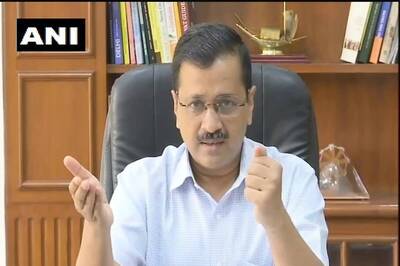
views
London: A possible referral of Iran to the UN Security Council over the resumption of its nuclear research program has moved closer after Britain, France, Germany said they will call for an emergency meeting of the UN nuclear watchdog.
Britain, France, and Germany the "EU3" said last week that they wanted the International Atomic Energy Agency to take up the issue. The IAEA can then forward the dispute to the UN Security Council.
Monday's announcement that the EU3, which have led failed negotiations with Iran over its nuclear activities, planned to call for a meeting on February 2-3 came after a meeting of diplomats from the three nations plus the United States, China, and Russia.
IAEA spokeswoman Tracy Brown said any country or countries could call for a meeting of the agency's board of governors, but that did not guarantee a meeting.
The board will make a decision on whether to hold the meeting, she said, adding that such decisions depend on various criteria, including the subject and "the urgency."
The US and the EU3 were seeking to persuade Russia and China to agree to a referral on Monday, CNN European Political Editor Robin Oakley said.
British officials would not confirm that the process of drafting a resolution for the IAEA meeting had begun. They say that more discussions with all 35 board members will go on right up to the IAEA meeting in Vienna and that there is a "huge amount of talk" to come.
Diplomats who declined to be named said there is not yet consensus on the actions likely to follow the IAEA meeting.
The US, Britain, France, Russia and China are the five permanent members of the Security Council and have the power to veto council resolutions.
US Secretary of State Condoleezza Rice said on Monday that Iran's latest actions "crossed the threshold" and that the IAEA board should hold an emergency meeting as soon as possible.
PAGE_BREAK
Speaking before the announcement of the emergency talks, she said the US feared that if IAEA members waited until a scheduled meeting in March, Iran would use the time to further "obfuscate" over any nuclear weapons plans, Reuters reported.
"We just can't let them do that," Reuters quoted Rice as telling reporters traveling with her to Liberia for the inauguration of Africa's first elected woman president.
"We have got to finally demonstrate to Iran that it can't with impunity just cast aside the just demands of the international community," she said.
But British Foreign Secretary Jack Straw, speaking in London ahead of Monday's meeting, said there should be no "rush" to international sanctions on Iran over its nuclear program.
Addressing a conference on international terrorism at the Royal United Services Institute, Straw emphasized that a referral to the Security Council did not necessarily mean economic sanctions.
He said the authority of the Security Council in itself could be enough to bring Iran back into compliance over its nuclear program, the UK's Press Association reported.
"I don't think we should rush our fences here. There are plenty of examples where a matter is referred to the Security Council and the Security Council takes action and that action is followed without sanction," PA quoted Straw as saying.
"The fact that Iran is so concerned not to see it referred to the Security Council underlines the strength of that body."
Tehran has threatened to force world oil prices higher if the Security Council imposes sanctions against it.
"Any possible sanctions on Iran from the West could possibly, by disturbing Iran's political and economic situation, raise oil prices beyond levels the West expects," local news reports and wire services quoted Economy Minister Davoud Danesh-Jafari as telling state-run radio.
Iran is the second-largest producer in the Organization of Petroleum Exporting Countries (OPEC).
PAGE_BREAK
Russia proposal
Iran resumed operations at its Natanz uranium enrichment plant last week and insists its activities are only aimed at research for a civil nuclear energy program.
But the US and much of Europe are concerned that the activities are a guise for building a nuclear weapon. Negotiations between Tehran and the EU3 on the subject broke down late last year.
Iran's nuclear program was also addressed in talks Monday between German Chancellor Angela Merkel and Russian President Vladimir Putin in Moscow.
Putin said Iran had not excluded the possibility of conducting its uranium enrichment in Russia, a proposal that could provide a way out of the escalating international tensions.
The Russia leader also advised treating Iran with caution. "In the Iranian nuclear issue, we need to work very carefully and without taking any abrupt, erroneous steps," Putin said.
The Russian proposal, backed by the Europeans and the United States, is aimed at getting Iran to move uranium enrichment completely out of its territory to ensure that its nuclear program cannot produce weapons.
On Sunday, Iranian Foreign Minister Manouchehr Mottaki said his nation was prepared to cooperate with the IAEA. He reiterated that Iran's nuclear activities were for "peaceful" purposes and that the "language of threat is not a good choice in diplomacy."
Earlier, a foreign ministry spokesman said Iran would not change its stance even if the IAEA meets in emergency session.
"We will defend our rights," foreign ministry spokesman Hamid Reza Asefi said. "Iran believes that we can come to a solution through talks, and there is no legal basis for referring Iran's dossier to the Security Council. We are not afraid at all if referred to the Security Council."
IAEA Director-General Mohamed ElBaradei, who said last week he had lost patience with Tehran, told Newsweek magazine Iran needs to come clean about its nuclear activities in the next few weeks so the IAEA can see "that there is nothing fishy, if you like, about the program."
ElBaradei said he could not exclude the possibility Tehran has a nuclear weapons program, and he cautioned Iran not to dismiss the diplomatic route to resolve the issue.
"Diplomacy has to be backed by pressure and, in extreme cases, by force," ElBaradei told Newsweek. "We have rules.
We have to do everything possible to uphold the rules through conviction. If not, then you impose them.
"Of course, this has to be the last resort, but sometimes you have to do it."




















Comments
0 comment